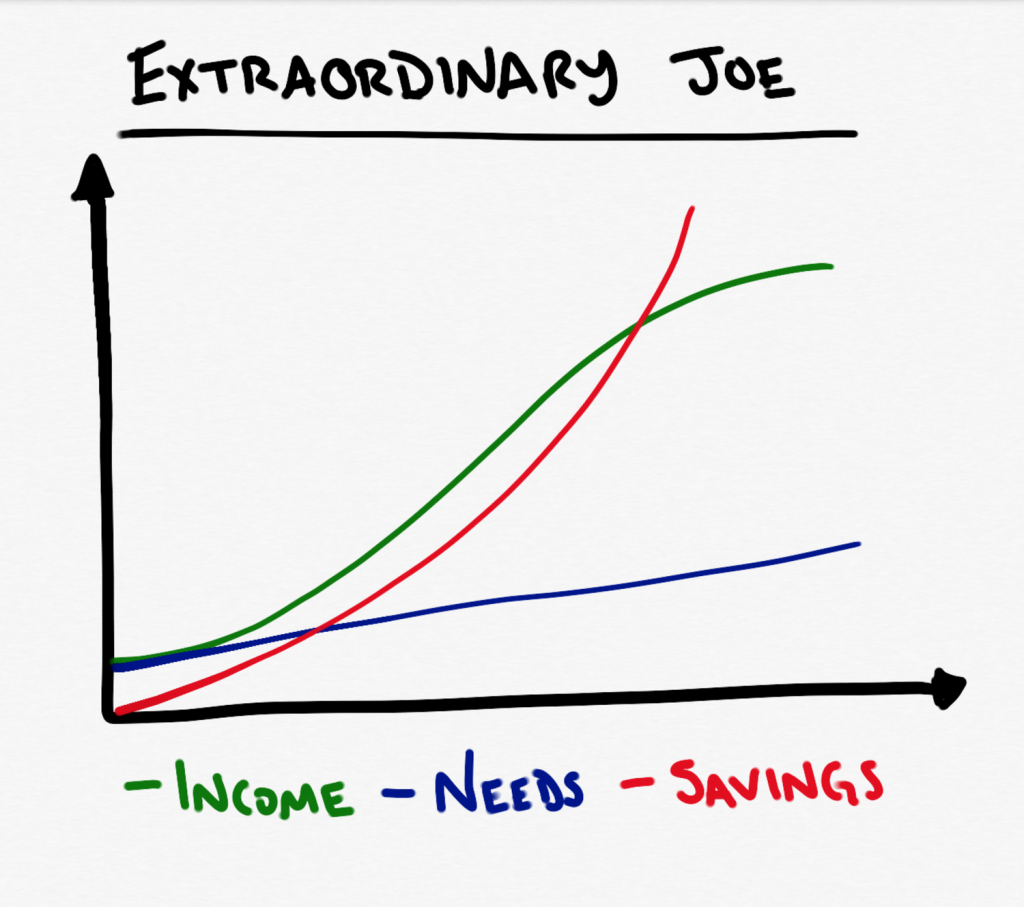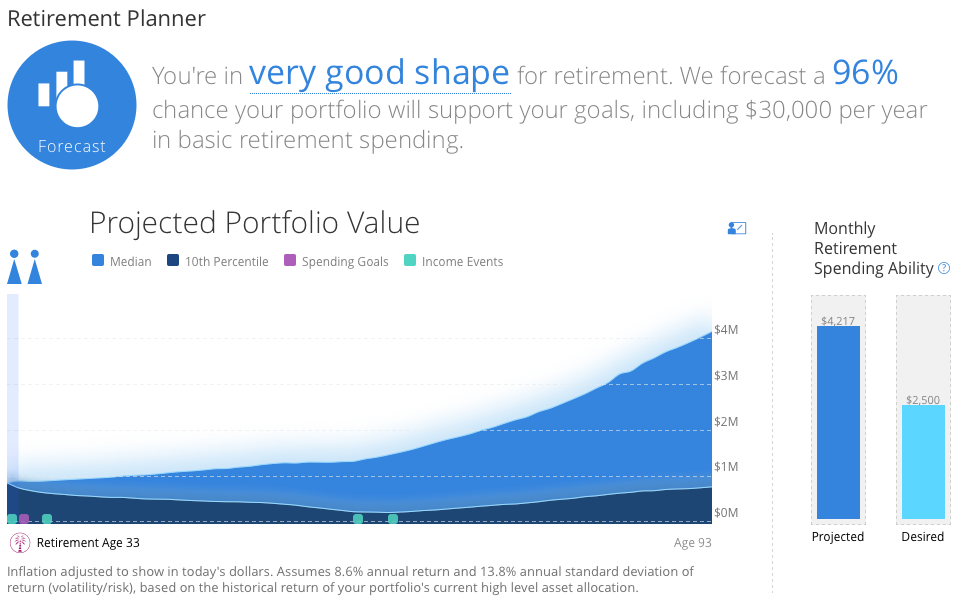High-income FI: This sales executive earns almost $400k a year, and saves half
This sales executive lives differently than most. He earns a high income. Close to $400,000, and to achieve high-income FI, they save half.

When it comes to things like lifestyle inflation and looking the part, a Tennessee sales executive and his wife know how to avoid the things that destroy an ability to build wealth and get rich. High-income FI is easier said than done - even if you're rich.
Craig and his wife live in Franklin, TN. He's a sales executive and his wife, Lynn, is in marketing - and together, they gross between $300,000 and $400,000 a year.
That's a ton of money. Way more than most of us earn in five years.
But, that's not the only thing that makes them different. High incomes have a way of lulling us into a false sense of security, making us believe that we can spend more simply because we earn more.
And to a certain extent, that's true. Dollar-for-dollar, we can spend more money than someone who earns less. But, the high-income debt phenomenon is alive and well and keeps too many people with big salaries working long careers for the sake of funding super expensive lifestyles.
But, Craig and his wife have chosen to live differently.

High-incomes and Big Choices
For the last two decades, they've worked successful careers with earnings north of $100,000. That's decades, not just years. This Tennessee family has a history of high income.
But in the last five years, their income has spiked to well over $300,000 - often flirting with the $400,000 figure. That's a ton of income, but earning that type of money also comes with it some serious choices:
- spend the large majority of earnings on big houses and nice cars in an effort to "play the part" by looking successful (a primary mark of the pseudo-affluent), or
- save as much as you can, while allowing yourself reasonable pleasures along the way, to achieve financial independence much earlier in life
"We made a decision in our forties (twenty years ago) to live a more modest lifestyle after making a judgment mistake the two prior years of buying all the home we could afford on paper," Craig told me.
"We had a career hiccup and lived in a $500K home with a $3,000 monthly mortgage payment."
To achieve financial independence (aka: high-income FI), they realized the key was to build wealth, not spend it. This detail, unfortunately, isn't common knowledge.
Achieving high-income FI in 5 steps
Craig and his wife took 5 basic steps to achieve high-income FI. We'll take a look at each one.
High-income freedom: Step 1: Sell the house
Their first step was to sell the big and expensive home that made them "house-poor" and buy a more reasonable home in the mid-$200,000. Take a look at their home now and you might not get the feeling that they earn high incomes.
But, that's also a big part of avoiding lifestyle creep, something that plagues too many Americans. Wealth is acquired through saving, not spending.

High-income freedom: Step 2: Invest in rentals
Next, Craig and his wife decided to diversify their income - a strategy that's common with a lot of successful millionaires. Income diversification is key.
They decided to become landlords.
"At the time with low overhead, we decided to maintain our current lifestyle and invest in a rental property with our extra mortgage free cash," he said.
"We looked locally but could never find the right rental property investment. The full-time investors snagged the best properties as soon as they hit the market. Additionally, I’m not a handyman type and repair/maintenance costs would erode most profits. We finally bought a two-bedroom oceanfront condo in South Carolina. We use it for our vacations (with our dogs) and it pays for itself. Maintenance is built into the management commissions we pay. We paid that mortgage off six years later."
High-income freedom: Step 3: Track money
"As our savings and net worth grew," he told me, "we made a conscious effort to make ourselves feel cash poor by putting over fifty percent of our income in long term savings like 401Ks, IRAs, etc."
And, he said, they started to track their savings every month.
"In 1994 at the age of thirty-nine, I started tracking our savings monthly. We had $77,000. That was just after the house downsize. It soon became quite important to establish an annual savings objective for the upcoming year."
An annual savings objective is how Craig and his wife gave their money purpose, a concept deep-seated in how successful people operate with their money. Without a purpose for your money, it's much tougher to reignite a sense of discipline to "stay the course".
But, they made it a game. A game that was fun to play.
"Every year we had to beat our objective. We hit our objective almost every year, with the exception of major market corrections which were painful."
Even with a high-income, it took them 20 years to pay off both their primary residence and their rental property...and accumulate a million bucks in investments.
Five years later, they hit the two million mark. How?
High-income freedom: Step 4: Save, save, save
"We reached two million dollars in cash/ market investments just five years later thanks to super saving of fifty percent of gross income or more and a good stock market."
It seems like everybody is making money hand over fist these days. The market is great. Investments are growing, and if you play your hand right, high-income earners can take full advantage of the wealth-building environment.
And, the techniques are simple. Save more than you earn. Keep your lifestyle in check. Set money goals and constantly re-evaluate your financial picture.
We use Personal Capital to maintain a sophisticated level of financial visibility.

And best of all? Even with a high-income, saving money instead of spending never made Craig and his wife feel as if they weren't "living the good life".
High-income freedom: Step 5: Love your "stuff"
"We drive decent cars and even have a fun convertible sports car for weekends. But when we buy a new car the plan is to get an interest free or low-interest loan and pay it off and then drive it for another five years."
For the record, I used to drive a 1999 supercharged Corvette, a car that was one of the loudest and fastest cars on the road and super fun to drive. I don't miss the car, but sometimes, I do miss the adrenaline rush I'd sometimes get when accelerating through the gears.
What else?
"We take very good care of our vehicles and they last for at least ten years. We just don’t incur any long-term debt, except for auto loans. In the last year, we decided to go completely debt free and paid off the auto loans a few years ahead of schedule. We own three cars: two 2015 models and 2014 model year. We may need another car in 2024 and only keep two cars in retirement."
For Craig, life wasn't always full of riches. In fact, he grew up in a poor household. Lynn did too, and frugality was one of the primary ways to survive.
"Once you are really poor and escape that situation, you NEVER want to go back. I will never forget going out for the basketball team with donated tennis shoes two sizes too big and tripping all over the court like a clown. Of course, I didn’t make the team."
Achieving high-income FI: Things Craig and his wife do to maximize their income to build wealth
In closing, let's look at the six major things Craig and Lynn do to build wealth.
- We only eat dinner out once per week. But even then, we usually go to reasonably priced restaurants. Having had to entertain clients over the years we both have been to a lot of very expensive places to eat all over the country. And quite frankly, most dinners are forgettable, with a few exceptions.
- When shopping for can goods and basic commodities we use Costco and Walmart.
- For meats and seafood, we will often time use Costco or Publix. Since I have a home office, I do most of the grocery shopping due to a flexible schedule. I actually enjoy it.
- I always have a list and do almost no impulse buying.
- My wife is the cook in the house and prepares for meals during the weekend in such quantities that we can have leftovers Monday through Thursday. Cooking after coming home from the office isn’t necessary. Most Friday nights we will have dinner out to celebrate the weekend. The savings we realize eating meals this way at home are substantial.
- Do the math: eat out four nights a week at $75 for two equals $15,600 per year. And friends go out for lunch five days a week. At $10 per day you have another $2,600. That’s over $18,000 per year! All of these little expenses erode the ability to save. Avoid the above costs for 10 years and you have an extra $180,000 plus interest!
What else? Here are Craig's 7 essentials to high-income FI:
- Pay off all credit cards monthly.
- Make purchases based on the need/want qualification. Avoid impulse buying.
- Keep automobiles for ten years.
- Prepay mortgage debt as soon as possible.
- Have automatic savings plans.
- Budget monthly.
- Set one, two, and even three-year savings goals.
"Now, with our condo paid (value $250K+) home paid for (value $450K) and investments recently topping $2M; we feel financially secure to retire in a couple of years. But even now we still take lunch to work, eat dinner out only once a week, and we don’t pay for Starbucks coffee."
We live a frugal lifestyle. And we are happy….